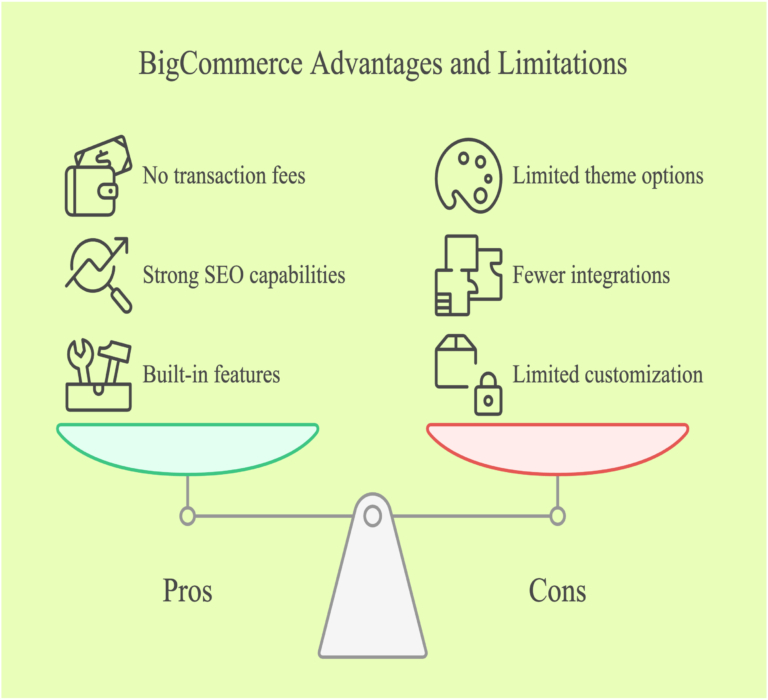Greetings! I'm Aneesh Sreedharan, CEO of 2Hats Logic Solutions. At 2Hats Logic Solutions, we are dedicated to providing technical expertise and resolving your concerns in the world of technology. Our blog page serves as a resource where we share insights and experiences, offering valuable perspectives on your queries.

Quick Summary
Large businesses need specialized e-commerce platforms that can handle high-volume transactions and complex operations. The top 5 platforms are Shopware 6 (flexible & modern), Shopify Plus (user-friendly), Magento Commerce (highly customizable), BigCommerce Enterprise (cost-effective), and Salesforce Commerce Cloud (AI-powered). Choose based on your business model, technical needs, and budget. Look for platforms with strong scalability, multi-channel capabilities, and global commerce features.
Do you think your business needs an e-commerce platform that can handle more? Or are you confused about which e-commerce platform to choose for your large business?
In this blog, let’s explore different e-commerce platforms and we will help you select the one that fulfils your large business requirements.
Why Large Businesses Need Specialized Ecommerce Platforms?
The challenges that large businesses face are different from the basic ones. The basic e-commerce solutions simply cannot handle the requirements.
Large businesses require an e-commerce platform that can process thousands of transactions simultaneously, manage complex inventory systems, and integrate smoothly with existing business tools.
Best E-commerce Platforms for Large Businesses
Take a look at different e-commerce platforms that may be suited for your large e-commerce business.
Shopware 6
First, take a look at Shopware 6 for your large e-commerce business.
Pros:
- Built on a modern technology stack, it is highly flexible and scalable.
- Shopware plugins are available, it is easy to add more functionalities to your e-commerce website.
- Strong content management system for easy shopfront customization.
- The Shopping Worlds feature allows businesses to create engaging shopping experiences without heavy development.
- Well-suited for businesses targeting global markets.
- Availability of experienced Shopware 6 developers.
- Shopware documentation, help centre, and support are available easily.
Cons:
- Smaller app ecosystem compared to some competitors.
Shopify Plus
Take a look at the pros and cons of Shopify.
Pros:
- Quick and easy setup, allowing businesses to launch rapidly.
- Simple and user-friendly admin interface.
- An extensive app marketplace for adding features as needed.
- Fully managed hosting ensures stability and security.
Cons:
- Limited customization compared to open-source platforms like Shopware.
- Transaction fees apply unless Shopify Payments is used.
Magento Commerce
Now take a look at how Magento can be your e-commerce solution.
Pros:
- Highly customizable, it increases sales, allowing businesses to create tailored e-commerce experiences.
- Strong B2B features, making it ideal for wholesale and enterprise-level selling.
- Multi-store management for businesses operating multiple brands or regions.
- Extensive API support for integrating with third-party systems.
Cons:
- Upgrades to newer versions can be complex and time-consuming.
- It requires significant technical expertise to set up and manage.
- Higher development and maintenance costs.
Find out which to choose when you are confused between Shopware and Magento.
BigCommerce Enterprise
Take a look at how BigCommerce can serve your requirements.

Pros:
- It comes with built-in features, reducing reliance on third-party apps.
- Strong SEO capabilities to help improve search rankings.
- There are no transaction fees, unlike some competitors.
- Regular updates ensure security and performance improvements.
Cons:
- Limited customization options for themes.
- Fewer third-party integrations compared to Shopify and Magento.
Salesforce Commerce Cloud
Take a look at how Salesforce can be your e-commerce platform.
Pros:
- AI-powered personalization enhances the shopping experience.
- Excellent omnichannel capabilities for seamless online and offline integration.
- Deep integration with other Salesforce products for a unified business ecosystem.
- Built-in A/B testing helps optimize conversions.
Cons:
- High cost of ownership, making it less accessible for smaller businesses.
- Complex implementation process requiring technical expertise.
- Steeper learning curve compared to other platforms.
Key Features for an Enterprise E-commerce Platform
Before diving into specific platforms, let’s understand what makes an e-commerce solution enterprise-ready:
Scalability and Performance
Scalability and performance are crucial for an enterprise e-commerce platform. This is crucial in handling high traffic and ensuring a smooth shopping experience.
Features like advanced caching help pages load faster. The cloud-based infrastructure allows it to expand without disruptions.
Load balancing ensures the website remains stable even during peak sales. Having CDN helps to speed up content delivery worldwide, reducing customer delays.
Multi-channel Capabilities
A strong e-commerce platform should make it easy to sell across multiple channels without complications. Unified inventory management keeps stock levels accurate across online stores.
Centralized order management helps to ensure smooth processing and fulfilment. Consistent pricing and promotions create a seamless customer experience.
Integrated social commerce features help businesses showcase and sell directly to customers on platforms like Facebook and Instagram.
Global Commerce Features
For businesses selling internationally, the right e-commerce platform should simplify global transactions. Multi-language support allows customers to shop in their preferred language, while multi-currency options ensure smooth payments in different regions.
Built-in tax compliance helps businesses meet local regulations, and international shipping options make it easy to deliver products worldwide without logistical headaches.
How to Choose the Right Platform?
Consider these key factors when making your decision:
Business Model Alignment
Your platform should match your business needs, whether you’re selling directly to consumers (B2C) or other businesses (B2B).
Consider your current and future sales volume, expansion plans, and the need for integrations with tools like ERP or CRM systems.
Technical Considerations
Think about whether you have an in-house tech team or need a platform that requires minimal coding.
If your store needs custom features, strong security, or specific hosting options (cloud or self-hosted), choose a platform that supports these requirements.
Budget Factors
Beyond the initial setup cost, factor in ongoing expenses like maintenance, license fees, and future development. Some platforms have lower upfront costs but require more paid extensions, while others may need bigger investments for customization.
Conclusion
Choosing the right e-commerce platform for your large business is a critical decision that impacts your long-term success. While each platform has its strengths, the best choice depends on your specific business requirements, technical capabilities, and growth plans.
Do you need expert guidance in choosing the perfect e-commerce platform for your large business? Contact our 360-degree e-commerce specialists today for a personalized consultation that aligns with your business goals and technical requirements.
FAQ
I'm running a large business why can't I just use a basic e-commerce platform?
Basic platforms won't be sufficient because your large business needs to handle thousands of transactions at once and manage complex inventory systems.
Which e-commerce platforms are best for my large-scale business?
Consider five main players in the enterprise space: Shopware 6, Shopify Plus, Magento Commerce, BigCommerce Enterprise, and Salesforce Commerce Cloud. Each has its strengths; for instance, Shopware 6 is great for flexibility, while Shopify Plus offers rapid setup and ease of use.
What should I really be looking for when choosing a platform for my large business?
Focus on three essential capabilities: First, can it handle high traffic? Second, does it support selling across multiple channels ? And third, does it offer global commerce features if you're planning to sell internationally? These are the features that will really matter for your business scale.
How do I make sure I'm choosing the right platform for my business?
What's your business model, B2B or B2C? Do you have a tech team, or do you need something more user-friendly? And importantly, what's your budget looking like, not just for setup but for ongoing costs? Your answers to these questions will guide you to the right platform.

Related Articles






